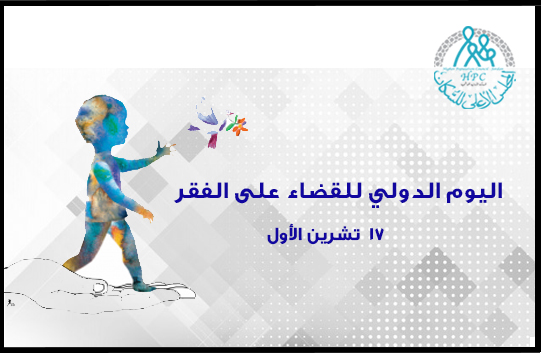

Today, Sunday, Jordan and the world celebrate the International Day for the Eradication of Poverty, which falls on the seventeenth of October each year. The theme this year is: “Building Forward Together: Ending Persistent Poverty, Respecting all People and our Planet”
The year 2020 witnessed a tragic increase in hunger in the world, according to the United Nations, due mostly to the repercussions of the Corona virus pandemic, and overall, more than 2.3 billion people (or 30% of the total population) lacked adequate food throughout the year, Malnutrition persisted in all its forms, and according to the World Bank, the Corona pandemic has pushed between 88 and 115 million people into poverty, with the majority of these new poor in South Asia and sub-Saharan countries, where poverty rates are already high, and in 2021, this number is expected to rise to between 143 and 163 million, those introduced by the pandemic will join the 1.3 billion poor already living in multidimensional poverty, their deprivation will continue to worsen during the global pandemic, and the measures imposed to curb the spread of the pandemic have pushed them further into poverty, as the informal economy that allows the poor to survive in many countries has been closed.
The Secretary-General of the Higher Population Council, Dr. Abla Amawi, indicated in a press statement on the occasion that a new international study prepared by the United Nations Women and the United Nations Development Program revealed that the Corona virus pandemic and its repercussions undermine progress in efforts to eradicate extreme poverty, and women bear the burden, and the study indicated that It is probably to push another 47 million women into poverty, reflecting decades of progress in eradicating extreme poverty and increasing the poverty rate among women by 9.1%, and that the pandemic will affect the global poverty rate in general, and those women will be disproportionately affected, especially women of reproductive age, and that by 2021, there will be 118 women for every 100 men between the ages of 25 and 34 years living in extreme poverty (1, $90 a day or less), and the gap is expected to increase to 121 women for 100 men by 2030.
Amawi pointed out that the rates and severity of poverty among women are higher than among men, due to women's preoccupation with unpaid roles (motherhood and family care), and in return men's preoccupation with paid work, which led to the concentration of money in the hands of men in exchange for women's poverty.
Amawi indicated that the Corona pandemic affected the poor segments more than other segments of society, especially laborers day, women, refugees and those working in the private sector and the various affected sectors, indicating that the government took several measures in this framework and within defense orders, among the most important of them, is the establishment of the “Himmat Watan Fund”, and to study the situation of workers who were negatively affected by the pandemic, they are “day-labour in the construction, agriculture and tourism sectors, taxi drivers, workers in the public transport sector, and owners of small businesses,” in addition to the Central Bank of Jordan’s announcement of a package of measures aimed at containing the repercussions of the impact of the emerging corona virus. .
Amawi explained that the Corona pandemic had significant economic and social impacts on Jordanian society, and according to the Department of Statistics, the unemployment rate reached about 24.8% for the second quarter of 2021 (males 22.7%, females 33.1%), while Among young people in the age group (15-24 years) 48.5% (43.6% for males compared to 71.6% for females), where unemployment rates are directly reflected on the poverty rate in Jordan, Even if there are no new figures announced, indicating that the report of the results of the Household Expenditures and Income Survey (2017-2018) issued by the Department of Statistics stated that the poverty rate among Jordanian individuals reached 15.7%, meaning that 1,069 million Jordanians are in the poverty area.
The poverty rate of hunger in Jordan reached 0.12%, equivalent to 7,993 individuals. As for the poverty gap, it reached 3.5%, and the severity of poverty reached 1.2%.
The Higher Population Council indicated in the statement that the Jordanian government has made great efforts during the past three years, including cash transfers instead of bread subsidies, and updated data and methodology on poverty, in addition to launching the National Social Protection Strategy (2019-2025) in 2019, where the strategy includes four axes :which is basic (labor market policies, social insurance, social services, and social assistance), and are consistent with the sustainable development goals, especially those related to the first goal “eradicating poverty and extreme poverty in all its forms everywhere,” and the second goal “eradicating hunger and providing food security.” The eighth goal is to "promote sustained economic inclusive and sustainable economic growth, full and productive employment, and decent work for all."
The Council recommends that reducing poverty rates requires integrated, multi-sectoral policies that can be more cost-effective, and include high-impact methods to address interrelated deprivations, such as economic expansion that allows for greater economic participation and employment opportunities, and support for the productive capacities and ownership of the poor productive assets, as well as providing good quality services to the poor in health, education and public utilities, expansion of micro-credit programmes without benefits, empowerment of women and comprehensive social protection of poverty.







